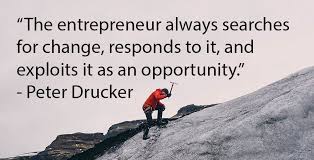AFRICAPITALISM: AN EXPOSITION ON ENTREPRENEURSHIP (3)
AFRICAPITALISM:
AN EXPOSITION ON ENTREPRENEURSHIP (3)
© 2018 CHIBU NDUBUISI 27/10/2018 WEEK 43
Peace be upon you.
As the 2018 TEF forum ends, this piece is the concluding part
in three series exposition on Africapitalism, Entrepreneurship & Peace Building.
WHO
IS AN ENTREPRENEUR?
The word entrepreneurship is derived
from the French word “entreprende” meaning to undertake. Whoever is involved in
the process of entrepreneurship is an entrepreneur. In the words of Schumpeter
(1934)
“An entrepreneur is someone who undertakes
the responsibility of making innovation in the economy , that is, either
introducing new goods, new methods of production or a distribution, opening and
developing new markets, developing a new source of supply of raw materials,
carries out a new organization or enterprises of an industry.
HOW ENTREPRENEURS ARE MADE: NURTURE OR NATURE:
Ernst and young world entrepreneur of
the year programme in 2011 surveyed 68 entrepreneurs in trying to explain
whether nature or nurture brews entrepreneurship. These are the findings of
their report. That most entrepreneurs start from an earlier age because there
are no entrepreneurship genes. They see opportunity where others see disruption
and that culture has strong influence on risk taking and tolerance for
failure.(Ernst&yong 2011;7,14). Elumelu (2015) posited that
entrepreneurship is a long term journey. Great entrepreneurs are not made over
night, all should dare to dream, implement their dream and stay focused.
A good entrepreneur will show his or
her personality not when the sun is shining, that is, when the business is
moving well, but when it is raining, when in crisis. (Muller T, 2011;20), Gotteid
E.. Ross JA (1997) . These traits are not inherent but are learnt in the
process of doing.
UNDERSTANDING NECESSITY AND OPPORTUNITY
ENTREPRENEURS
Acs,
Z J (2006) classified types of entrepreneurship as necessity entrepreneurs
and opportunity
entrepreneurs. To him necessity
entrepreneurs is a situation of having
to become an entrepreneur because you have no better option, while
opportunity entrepreneur is an active choice to start a new business enterprise
based on the perception that an unexploited or under exploited business exist.
My point here is not about necessity or
opportunity entrepreneur it is about positive engagement of the population with
jobs that contributes to productive living. Since most African economies are
still factor driven economies and operate along that line. We must work towards
moving to an efficient driven or innovation driven economy.
MODELS OF ENTREPRENEURS
Brackman & Jaffe (2008;145)
classified entrepreneurs in three categories
(a).
The Classic Entrepreneur: Has the
sole aim to keep making more deals and profit in the business without giving
back to the society.
(b).
The Social Entrepreneur: who intends
to make the world a better place with his resources and along the way make
profit from such endevours. This is where Africapitalism hinges on creation of
social wealth.
(c).
The Spiritual Entrepreneur: who
earmarks some percentage of his wealth for charity compulsorily and use it in
helping those who are in need.
UNDERSTANDING
THE RISK AND CONSTRAINTS ENTREPRENEURS FACE
Nwachukwu
in Onyia (1990:52) highlighted the risk that the entrepreneur is exposed to on
a daily basis to include.
·
Family Risk: the entrepreneur risks the smoothness
of the day to day running of the family and parental unity of the children.
·
Financial Risk: The entrepreneur risk the hard earned
capital which he got through austere savings or through loans
·
Emotional Risk: that is having stressful feeling when
the enterprise is going through a trial period.
While Adewumi
(2004),
list the following as constraints of entrepreneurship
·
Lack of and
poor access to credit facilities,
· Unstable
and largely un-conducive macro-economic environment heavily beclouded by
uncertainties in the political and policies intervention.
·
Poor
infrastructure and lack of basic utilities, water, electricity,
telecommunication etc.
·
Near
complete absence of advisory services.
·
Lack of
information on markets
·
Lack of
focused government policies to promote and drive the patronage of local
products by the government and its agencies, business organization and
citizens.
The journey of entrepreneurship
is never a rosy one. Africapitalism
is a point, when we take ownership and responsibility to help in providing the
fuel for the future. It is about how to stand on ones feet through wealth
creation and its concomitant vehicle of achieving this is through entrepreneurship.
Africapitalism is about identity
politics and socio-economic reawakening of Africans, strong in the moral sense
of using its values to strengthen communities and reconnecting to a shared
moral code, revitalizing shared responsibilities and sustaining a conversation
that ultimately contributes to productive living.
Peace be with you.

Comments
Post a Comment